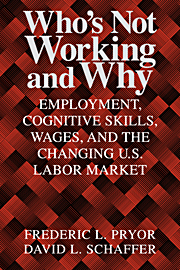Book contents
- Frontmatter
- Contents
- List of tables and charts
- Acknowledgments
- Introduction
- Employment, Cognitive Skills, and Job Displacement
- 2 Cognitive Skills, Education, and Other Determinants of Employment
- 3 Upskilling and Educational Upgrading of Occupations
- 4 Labor Force Displacement Mechanisms
- Wage Levels and Distribution
- Alternative Approaches
- Implications and Interpretations
- Appendix Notes
- Bibliography
- Name Index
- Subject Index
3 - Upskilling and Educational Upgrading of Occupations
Published online by Cambridge University Press: 25 March 2010
- Frontmatter
- Contents
- List of tables and charts
- Acknowledgments
- Introduction
- Employment, Cognitive Skills, and Job Displacement
- 2 Cognitive Skills, Education, and Other Determinants of Employment
- 3 Upskilling and Educational Upgrading of Occupations
- 4 Labor Force Displacement Mechanisms
- Wage Levels and Distribution
- Alternative Approaches
- Implications and Interpretations
- Appendix Notes
- Bibliography
- Name Index
- Subject Index
Summary
The previous chapter focuses on the supply side of the labor market; in this chapter we begin to discuss the demand side. Much of our analysis here is about the ability, skill, and knowledge “requirements” of particular jobs. In particular, what are the requirements of existing jobs? How have these changed over the past quarter-century? Have the requirements of less-skilled jobs increased, making it difficult for less-educated persons to satisfy them? Have the requirements of more-skilled jobs also increased, making advanced training and high-skill levels more important than ever?
These questions do not seem difficult to answer. Certainly most discussions in the popular press suggest that the answer to the last two questions is “yes.” In other words, the assumption is made that it has become more difficult for less-educated persons to meet the requirements for less-skilled jobs, and for more-educated persons to meet the requirements for more-skilled jobs. Thus, it is essential that everyone should acquire more education and skills than in previous generations. Those who do not are likely to be jobless, underemployed, or working for very low wages. According to this view, it is not surprising that high-school dropouts have such a high jobless rate. The solution to this problem is to encourage more education and training. The empirical analysis in this chapter, however, shows that there are some fatal flaws in this argument.
In the first section we present data supporting a key finding of this book – one that immediately challenges the standard story.
- Type
- Chapter
- Information
- Who's Not Working and WhyEmployment, Cognitive Skills, Wages, and the Changing U.S. Labor Market, pp. 47 - 73Publisher: Cambridge University PressPrint publication year: 1999



